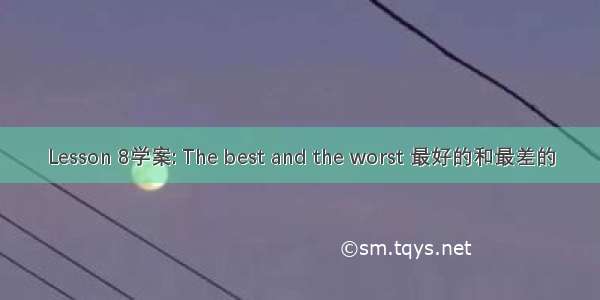
【课文讲解】
1. Nearlyeverybody enters for‘The Nicest Garden Competition’ eachyear, but Joe wins
everytime.几乎每个人都参加每年举办的“最佳花园竞赛”,而每次都是乔获胜。
(1)nearly和almost意义相似,表示“几乎”、“差不多”的意思,在不少场合可以互换使用:
I’m nearly / almost ready.我快准备好了。
①I have nearly / almost (forget) his name.我差点把他的名字忘了。
但有以下区别:
A). nearly常用于即将开始的情况,而almost常用于动作即将结束的情况。
②It’s (差不多) 6:00, so we’ll soon be off work. 快六点了,我们很快就下班了。
③It’s (差不多) 6:00, so the film will begin in a minute.
B). almost后可跟除not以外的否定词,而nearly则不能跟否定词。
④(几乎) no one takes a rest.几乎没人休息。
但almost和nearly都可以用在行为动词的否定式前。
⑤( ) He almost / nearly say anything. 他几乎什么都没说。
A. don’t B. didn’t C. no D. not
⑥( ) It’s so easy as you think. 这件事远不如你想的那么容易。
A.no nearly B. not nearly C. no almost `D. not almost
特别提示:not+nearly表示“远不如”的意思。
(2)each和every均可译为“每一个”,二者常常可以互相代替使用。但是each更强调个体。
它常指确定并有限的数目;every常用来指一个大的、不确定的数目:
①Each child in the school (be) questioned.学校里的每个孩子刚才都被询问过了。
②Every child (enjoy) Christmas.所有的/每个孩子都喜欢过圣诞节。
另外,each既可以作形容词又可以作代词,但every只能作形容词:
③They each (have) a share.他们每人都有一份。
④Each of us (have) his own work to do.我们每个人都有自己的工作要干。
⑤( )boy was there and did his part.所有的孩子都在那儿,每个人都尽了本分。
A. Each; every B. Each; each C. Every; each D. Every; every
(3)win 和beat是不同的“赢”
win和beat都可用作及物动词,作"赢"、"战胜"讲时,其区别主要在于宾语的不同:
win的宾语的是比赛、战争、奖品、金钱等名词,即race,match,game,competition,
war,prize之类的词;win还可用作不及物动词(没有宾语的“赢”就用哦)。
beat的宾语的则是比赛、竞争的对手,即指人或球队的名词或代词。例如:
①He (赢) the firstprizeinthesurfingcompetition.他在冲浪比赛中获得一等奖。②We (赢) thestrongestteaminthefootballmatchthistime.
③I usually (赢) when we play cards. 打牌的时候,一般总是我赢。
注意:win the match = beat sb. in the match = win over sb. in the match
④We beat them in the match by a score of 3 to 2.
= We them in the match by a score of 3 to 2.
= We by a score of 3 to 2.
2.Bill Frith’s garden is larger than Joe’s. 比尔·弗里斯的花园比乔的花园大。
一、名词加-’s表示所属关系,构成名词的所有格。这类名词往往指有生命的东西,特别是人。所有格的语法作用相当于形容词,限定后面的名词。这个被限定的名词在上下文中第二次被提到时可以省略,只要不引起误解:
Mary’s dictionary is thicker than Jane’s. 玛丽的词典比简的厚。
My pen is lost. This one is my brother’s. 我的钢笔丢了。这支是我兄弟的。
3.He has madeneat paths and has builta woodenbridge over a pool.
一、make用作及物动词(vt.),主要含义主要有:
1).做;制作;制造(多指制造小东西)。如:
Canyoumakeanymoon-cakes?你会做些月饼吗?
◆make后可跟双宾语,间接宾语后移时一般用for引导。如:
①Myunclewillmakemeakite.=Myunclewillmakeakite(for; to; by; on)me.
2).使;使之。如:
②HaveImademyself(clearly; clear; cleared)?我讲清楚了吗?
3).迫使;令。如:
③Idon’tlikemilk,butshemademe (drink; to drink; drinking )it.
◆make用作使役动词表示“使;让”时,在主动语态中,其后的不定式(宾语补足语)要
省略to,但在被动语态中,to不能省去。如:
④Don’tmakethebaby (crying; cry; to cry; cried ) anymore.不要再让那个孩子哭了。
⑤Shewasmade (wait; to wait; waiting) foroveranhour.她被迫等了一个多钟头。
◆英语中,类似于make这种用法的动词还有let,have,hear,see,watch,notice,feel等。如:
⑥Isawhim (put) thekeyintothekeyhole,(turn)itand(open)
thedoor. 我看见他把钥匙插进锁孔,转动钥匙,然后打开了门。
⑦Shewasnoticed(go) intotheclassroom.有人注意到她进了教室。
4).准备;布置;整理。如:
⑧Youmust(整理床铺) afteryougetup.你起床后必须整理好你的床铺。
二、build 用作及物动词(vt.)指(用各种材料)建造房屋、桥梁等大型建筑物。
①Huge dams have (build) across the river.横跨大江建起了巨大的水坝。
②The house (build) of brick.这房子是砖造的。
③He has (build) his parents a new house. 他为父母亲兴建了一栋新房子。
= He has built a new house (for; to; by; on) his parents.
build也可指抽象“创建;建立”,如建立国家、创办公司等。
④He and a partner (build) a successful fashion company.
他和同伴创办过一家成功的时装公司。
◆build 还可用作名词,表示“体格、体型”和(船等的) 造型,构造
⑤a man of sturdy build(翻译):;⑥of the same build(翻译):
⑦He has a poor build.(翻译):
三、部分名词加-en结尾,可变成定语形容词。如:
wooden(木头的,木制的),golden(金色的),wool(l)en(羊毛的)
例:The picture was mounted in a wooden frame.那幅画安装(/镶嵌)在一只木质画框里。
四、...but I do not like hard work.
hard work: 艰苦的工作。比较:
◆Work Hard (艰苦/努力/勤奋工作) ≠Hard to Do Work(艰苦/艰难地去工作)
艰苦工作,就是刻意、主动地工作,尽管很辛苦,但不会使你精疲力尽,它能让你最高效地达到工作效果。
艰苦地去工作,让你处在一种错误的忙碌状态中,不断感受疲惫和压力,但实际成就或能力的提升却效果甚微。
简明通俗的说法是:你干得很辛苦,不代表你干得有价值。
语法(Grammar in use):形容词和副词的比较级和最高级
一、形容词、副词的比较级和最高级的构成规则
1.单音节词和少数以-er,-ow结尾的双音节词,比较级在后面加-er,最高级在后面加-est;
(1)单音节词如:small →smaller →smallest;great →greater →greatest
(2)双音节词如:clever →→;narrow→→
2.以不发音e结尾的单音节词,比较在原级后加-r,最高级在原级后加-st;如:
large→→;nice→→;able→→
3.重读闭音节词且末尾只有一个辅音字母时,先双写末尾的辅音字母,再加-er或-est;如:
big→→;hot→→;fat→→
4. 以“辅音字母+y”结尾的双音节词,把y改为i,比较级加-er,最高级加-est;如:
easy→→;heavy→→;busy→→
5.其他双音节词和多音节词,比较级在前面加more,最高级在前面加most;如:
beautiful→→;
different→→;
easily→→.
注意:形容词最高级前通常必须用定冠词the,副词最高级前可不用。
形容词most前面没有the,不表示最高级的含义,只表示“非常”。
Itisamostimportantproblem.=Itisaimportantproblem.
6.有少数形容词、副词的比较级和最高级是不规则的,必须熟记。如:
good / well→better→best; ill / bad / badly→worse→worst;
many/much→more→most; little→less→least;
old→older/elder→oldest/eldest; far→further/farther→furthest/farthest;
二、形容词、副词的比较级和最高级的用法
形容词和副词一般有比较级和最高级。比较级相当于汉语中“比……更……”这种句型,
如果需要把所比较的两项都提到,那么就必须在比较级后用than。
1.“A+be+形容词比较级+than+B”意思为“A比B更......”。如: Thistreeistallerthanthatone.这棵树比那棵树高。注意:
①在含than的比较级中,前后的比较对象必须是同一类事物之间的比较。
②比较级前可用much, far, rather, a bit, a little, still, even等修饰表示程度。如:
Awatermelonis(more; much; very) biggerthananapple.
◆very,quite, more一般只能修饰原级,不能修饰比较级。
2.“比较级+and+比较级”或“moreandmore+原级”表示“越来越......”。如:
①Itbecomes (越来越暖和) whenspringcomes.
②Itisgetting(越来越凉爽).
③Ourschoolisbecoming(越来越美丽).
3.在含有or的选择疑问句中,如果有两者供选择,前面的形容词要用比较级形式。如:
Whois (tall; taller; the tallest),TimorTom? 谁更高,Tim还是Tom?
比较:Whois (tall; taller; the tallest),Ted,TimorTom?谁更高,Ted, Tim还是Tom?
4. “the+比较级+句子,the+比较级+句子”,表示“越......越......”。
①(much) moneyyoumake,(much) youspend.钱你赚得越多,花得越多。
②(hard) you work,(lucky) you will be.越努力越幸运。
5.表示倍数的比较级用法:可以用表示倍数的词或度量名词作置于比较级前修饰语。
⑴.Ais... timesthesize/height/length/widthofB.如:
( )Thenewbuildingisheightoftheoldone.这座新楼是旧楼的三倍高。
A.the threetimes B. three thetimes C. threetimes the D. threetimes
⑵.Ais... timesasbig/high/long/wide/largeasB.如:
( ) Asiaisfourtimesas asEurope.亚洲是欧洲的四倍大。(亚洲比欧洲大三倍)
A.large B. larger C. largest
⑶.Ais... timeslarger/higher/longer/widerthanB.如:
( )Ourschoolistwicethanyours.我们学校比你们学校大两倍。
A.big B. bigger C. biggest
最高级则表示在某个范围“最……”的概念。
最高级前面通常要加定冠词the,并有一个短语或从句限定其范围。最高级的限定范围一般用of, among, in等介词短语。
①John is (tall) of (/ among) the three brothers. 这3个兄弟中约翰个子最高。
②This is (cold) day in ten years. 这是来最冷的一天。
③Mary is (intelligent) person I’ve ever met.
如果觉得《Lesson 8学案: The best and the worst 最好的和最差的》对你有帮助,请点赞、收藏,并留下你的观点哦!














